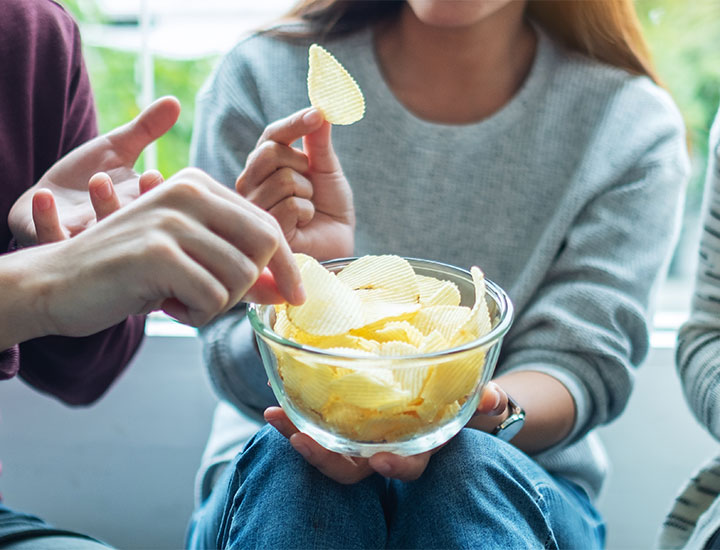
Unveiling the Culprit: How Potato Chips Contribute To Inflammation, Puffiness and Premature Aging
It's no secret that potato chips have super high salt content. If eaten often, Sethi notes that this can dehydrate your skin (and this can contribute to faster wrinkling along with cracking and peeling). "Due to osmotic pressure, salt draws water out of cells, including skin cells, leading to dry skin,” Sethi explains.
"Potato chips are notoriously high in salt and also contain a sizable amount of sugar," she adds. When there is an excess of salt and glucose in the body, Sethi continues, it cross-links with collagen and elastin, "proteins that give our skin its firmness and elasticity."
Elevated sugar and salt intake "hardens skin proteins, making your skin weaker, thinner and less hydrated," Sethi warns.
Inflamed, red skin, puffiness in your complexion and premature wrinkles can also be formed due to this. "The damaged skin proteins result in increased and premature wrinkles, sagging and discoloration of the skin," she stresses.
Factor agrees, and points out that "excess salt can be found in many popular potato chip products." Salt causes the body to "retain water and this leads to a swollen appearance," she concurs. Also, the cells "shrink and lead to dehydration," she adds.
"A lack of water leaves the skin with wrinkles" and as a result, this accelerates aging. "Not only can greasy foods like potato chips cause wrinkles," Factor says, but they also "may be the culprit behind acne breakouts, too."
What To Prioritize In Your Diet Instead
While having potato chips once in a while is fine, Sethi and Factor note that eating them (or foods like them) every day or multiple times a week without drinking enough water can wreck havoc on your complexion.
Instead of foods with salt, Sethi suggests trying to "season foods with lemon, black or red pepper and dried herbs." Sethi adds that "over time, the body will stop craving higher levels of salt while remaining more hydrated."
She also points out that "drinking at least 10 glasses of water (8 oz each) and of course, limiting consumption of such foods to once a week or less is the best way to achieve healthier looking skin."
To follow a healthy diet that will "optimize skin health," Factor says "you should consume foods rich in antioxidants and anti-inflammatory properties." The following foods all contribute to healthy, supple and hydrated skin, Factor says: "whole grains like wheat bread, brown rice, barley, millet, oatmeal and quinoa, beans." In addition, she lists the following: "legumes like black beans, navy beans, chickpeas, kidney beans, peas and lentils."
Factor concludes that vitamin C sources like "strawberries, red peppers, and grapefruit" are all no-fail snack choices if you want to prioritize your skin health, as well as leafy greens like "spinach and kale." These foods, she notes, are "rich in vitamin A, which is an antioxidant and nutrient that promotes healthy skin cell turnover."


